Mapping Conflict Motives: Katanga. (Update May- September 2008)
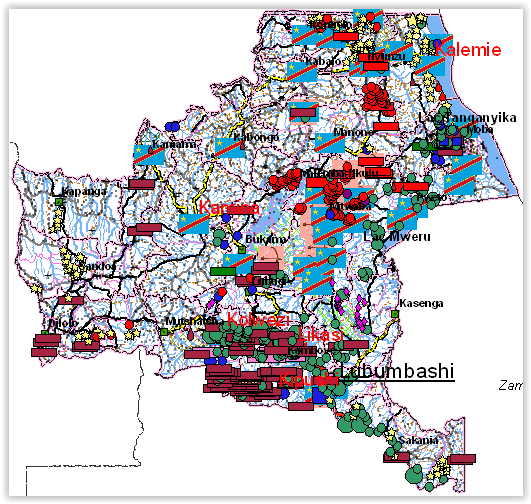
This report is the third (and for the moment the last) in a series of updates following an initial report on conflict motives in the Congolese province of Katanga. It analyses the most important security developments from May 2008 until September 2008. Download in pdf or open with issuu reader. The web maps We have […]
Illicit brokering of SALW in Europe: lacunae in Eastern European arms control and verification regimes
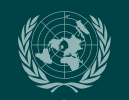
Download in pdf or open with issuu reader.
Towards a Sustainable Cocoa Chain: Power and possibilities within the cocoa and chocolate sector
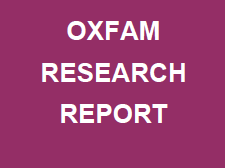
This report contributes in various ways to the debate on a sustainable cocoa economy. A sustainable cocoa economy is where each person investing time or money into the supply chain would be able to earn a decent income for themselves and their family, work in good conditions, and in a manner which did not harm […]
From conflict resources to sustainable development

Memorandum by Fatal Transactions on the European Union’s contribution to natural resource management in Africa This Memorandum looks specifically at the European Commission’s contribution to a sustainable exploitation of natural resources in Africa and a sustainable supply chain. It also assesses its approach on conflict resources. The paper provides an analysis of the Commission’s trade […]
Heeft Congo iets aan zijn mijnen?
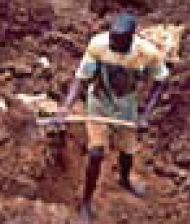
IPIS-MO. Congo beschikt over rijke reserves van erg gegeerde mineralen. Maar ondanks een florerende internationale markt plukt het land daar nauwelijks de vruchten van. Sinds het voorjaar van 2007 werkt Congo op verscheidene fronten tegelijk om die situatie te keren. Het onderhandelt met China over een ruil van Congolese grondstoffen voor Chinese investeringen in het […]
Fatal Transaction’s second submission on EIB Statement of Environmental and Social Principles and Standards
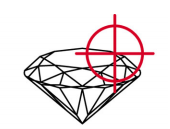
Fatal Transactions supports the initiatives of the European Investment Bank to revise its “Statement of Environmental and Social Principles and Standards”. We applaud the realisation of this revision in an open and transparent consultative process. This has without any doubt positively contributed to the revised draft Statement that has been presented by the Bank on […]
Mapping Conflict Motives: Katanga. (Update December 2007 – May 2008)
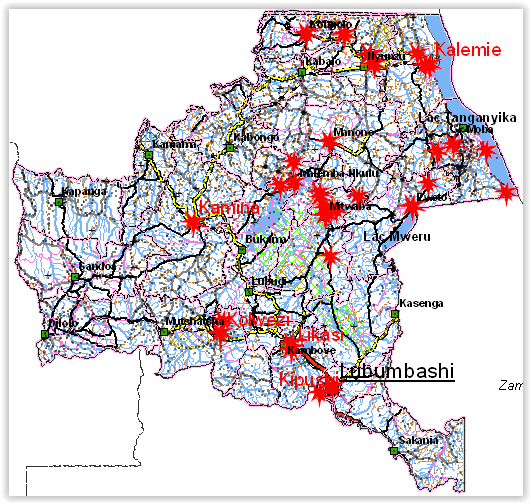
This report is the second in a series of updates following an initial report on conflict motives in the Congolese province of Katanga. It analyses the most important security developments from December 2007 until May 2008. Download in pdf or open with issuu reader. December 2007-May 2008 This report is the second in a […]
Democratic Republic of the Congo, mining contracts – state of affairs. The Congo wants to raise the profits of its mining sector.
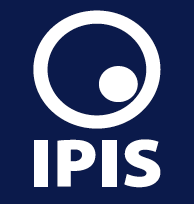
IPIS, Antwerp March 25, 2008, On Thursday 20 March the Congolese government published the final report of the Interministerial Commission for the Revisitation of Mining Contracts (the “Revisitation Commission”). The publication had been announced two days earlier in a press release from the Ministry of Mines. With the publication, a first phase is completed. The […]
Afghanistan: arms proliferation fuels further abuse
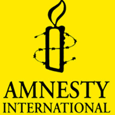
Download in pdf or open with issuu reader.
Transacties van de Nationale Delcrederedienst onder de loep. Een overzicht van enkele cases

Ieder land heeft het soevereine recht om projecten en werken op zijn grondgebied goed te keuren, rekening houdend met de effecten (positieve b.v. economische belangen of negatieve effecten b.v. schadelijke gevolgen voor het leefmilieu) ervan. Een buitenlands bedrijf moet bij zijn deelname aan dergelijke activiteiten rekening houden met bepaalde voorwaarden. Deze kunnen zowel worden geregeld […]
A Practical Guide about the International Human Rights Frameworks and how Business fits into it
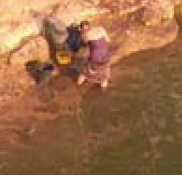
This guide provides business enterprises an overview of the international human rights frameworks. It also uses the Human Rights Compliance Assessment tool created by the Danish Institute for Human Rights. It should be used as a tool for businesses and does not absolve them from not working out detailed principles for the specific sector which […]
Het milieu- en sociaal beleid van exportkredietverzekeringsmaatschappijen. Een vergelijkende analyse
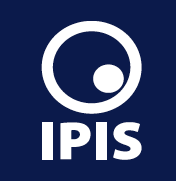
De Nationale Delcrederedienst, een Belgisch overheidsbedrijf, verzekert bedrijven tegen politieke en commerciële risico’s van internationale handelstransacties, onder andere met betrekking tot kapitaalgoederen, industriële projecten, aannemingswerken en diensten. In vele landen, zowel Westerse als ontluikende landen, kunnen bedrijven genieten van soortgelijke overheidssteun. De goedkeuring van dergelijke steun wordt in tal van landen onderworpen aan ethische voorwaarden. […]
Mapping Conflict Motives: Eastern DRC (March 2008)
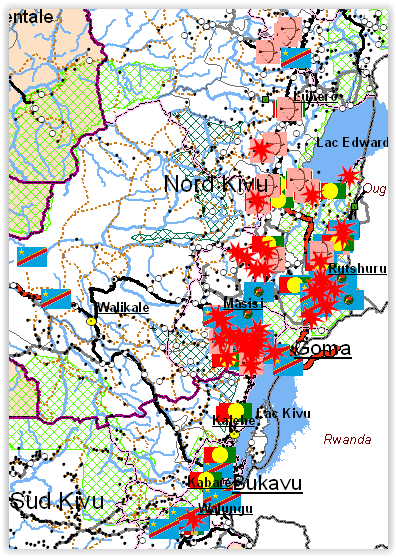
The eastern DRC is still plagued by violent conflict. The centre of the conflict is the ‘Petit Nord’ region where two large armed groups, a coalition of smaller bands of armed men and the government army are all involved in a persisting battle causing enormous human suffering. In the neighbouring regions of the ‘Grand Nord’ […]
Risky Business. The Lundin Group’s involvement in the Tenke Fungurume Mining project in the Democratic Republic of Congo
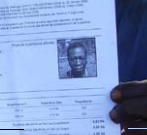
A SwedWatch/Diakonia/IPIS report. After a decade of war and political turmoil, the tide seems to be turning for the DR Congo. The country is now engaged in reconstructing a society that was destroyed by decades of dictatorship and a global power play. Activities are taking off in the mining sector as well. The DR Congo […]
The Kimberley Process and the UN: Lessons Learned
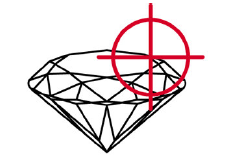
The United Nations, mainly through the UNSC and the UNGA, has played an important role in the genesis and development of the KPCS, an international control regime aimed at preventing conflict diamonds to enter into the legitimate trade. The earliest forerunner of the KPCS stems from an embargo imposed by the UNSC in June 1998 […]
Mapping interests in conflict areas: Katanga. (Update September-November 2007)
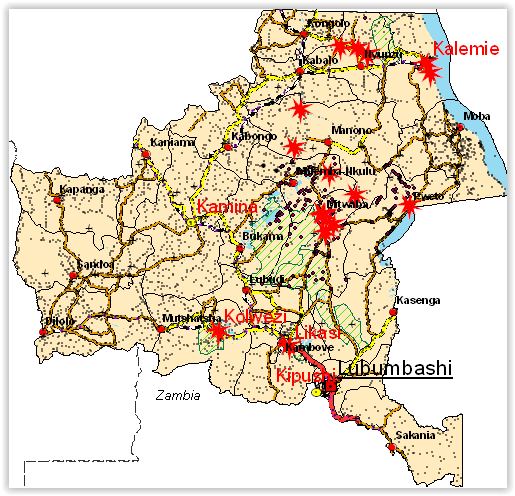
The International Peace Information Service (IPIS), a Belgium based research NGO, is a member of the Fatal Transactions consortium, which carries out the action ‘From Fatal to Fair Transactions’ with co-funding from the EU. IPIS’ contribution to this action is to develop a tool for the analysis of conflict drivers. Making use of GIS (Geographic […]
World Bank and DRCongo, Mining Session, Paris November 30, 2007

On November 29 and 30, 2007, a Consultative Group Meeting on the Democratic Republic of Congo took place at the World Bank’s offices in Paris. Download in pdf or open with issuu reader.
Congo blijft onder buitenlandse druk
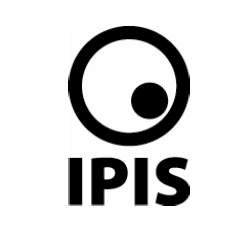
Dat president Kabila zijn bezoek aan Brussel inkortte, had één verifieerbare reden: Kabila verbleef vier dagen in Noord-Kivu waar in augustus opnieuw zware gevechten uitbraken tussen het regeringsleger en de rebellerende ex-generaal Laurent Nkunda. Maar Nkunda is niet Kabila’s enige kopzorg, hij ondervindt van meerdere kanten druk. Congolese waarnemers zien daarin de hand van het […]
Het beleid van exportkredietverzekeringsmaatschappijen

De privé-sector is veruit de belangrijkste motor van de wereldeconomie en bedrijven kunnen in belangrijke mate bijdragen tot de socio-economische stabiliteit van een regio of land, hebben de capaciteit om te zorgen voor technologische overdracht en kunnen welvaart genereren. Daarnaast is er een groeiende erkenning dat ze kunnen bijdragen tot conflictpreventie en duurzame vredesopbouw. Tegelijkertijd […]
Mapping interests in conflict areas: Katanga (August 2007)
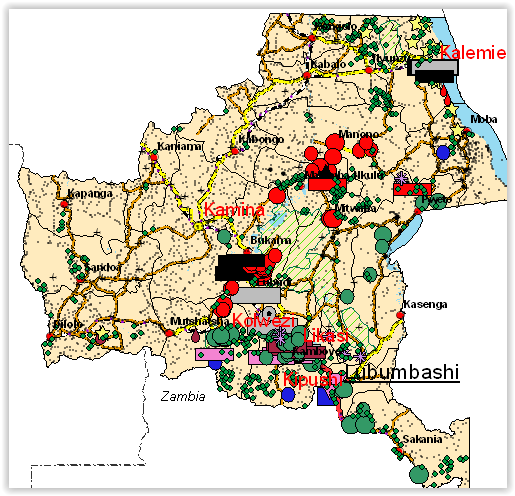
Revised version August 2007. ‘Mapping interests in conflict areas: Katanga’ reports on the presence of (ex-) combatants in the Congolese province of Katanga. It focuses on two broad categories: the ‘Forces Armées de la République Démocratique du Congo’ (FARDC) and the Mayi-Mayi militias. There is no significant presence of other armed groups in the region. […]

